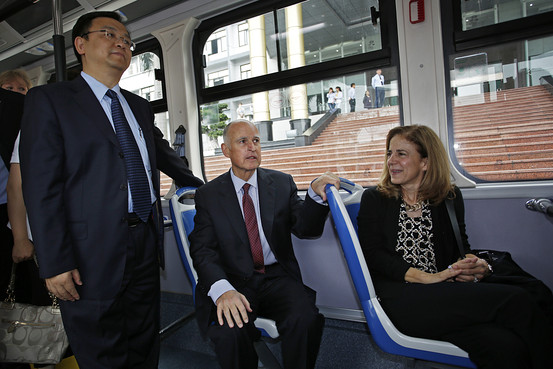Labor unions weren't happy when Governor Jerry Brown signed the Public Employees Pension Reform Act of 2012. The law, which applies to government workers across the state, allows government agencies more flexibility in extending the retirement age, increase employee contribution, and halt the practice of "pension spiking" for new employees. A full summary of the legislation is at the bottom of Brown's press release from last September.

In the battle over pension reform, the federal government has given transit unions a powerful hostage: federal appropriations to transit agencies. U.S. Secretary of Labor Thomas Perez decided that the new pension law runs afoul of the 1964 Urban Mass Transportation Act. Perez, and two of California's more powerful unions, argue the state's pension laws diminish the collective bargaining rights of unions.
Perez is threatening to withhold federal funds for state transit agencies that follow the state guidelines if and when transit unions object.
The Wall Street Journal argues that Perez is mis-interpreting the act and that Brown and state agencies are operating within the law. California Labor Secretary Marty Morgenstern agrees.
So either the state changes labor law for transit employees, the federal government backs down and sends the $2 billion in grants that were promised, or transit agencies throughout the state lose out on roughly $2 billion in expected, and budgeted, federal funds.
Potentially withheld funds include both capital and operating funds. Los Angeles Metro is first in-line to lose out on funding. The federal government will decide on a $268 million request on Friday. Next in line is the Orange County Transit Agency. Smaller agencies will be hit hard as well. Sacramento's regional agency could lost $70 million, including funds needed for a new light rail line. Santa Barbara's Metropolitan Transit District would have to reduce services by 30% and lay off 50 bus drivers without its federal grant.
Thus far, transit unions in the Bay Area have not formally protested to the Department of Labor over the pension plans despite their ongoing strike. While Streetsblog is certainly not privy to the internal negotiations, it's hard to imagine that the unions aren't threatening to do so at the bargaining table.
To make the issue more pressing, Moody's Investor Services is considering downgrading the credit ratings of Metro and other state transit agencies because of the confusion over whether or not they will receive federal funding. A change in credit rating could cost agencies even more, as Moody's ratings help determine the interest rate agencies will receive on loans that finance most major expansion projects.
Brown is desperate to avoid a lawsuit over Perez's interpretation unless funding for state agencies is secured. The Governor's office is floating a plan to quickly pass legislation temporarily restoring the former pension plans for future employees while California and the Federal Department of Labor duke it out. Whether or not that plan will pass muster with Perez, even if it is executed, remains to be seen.
The Teamsters and ATU argue for a different resolution. The unions support legislation by Assemblyman Luis Alejo, D-Watsonville, that basically excludes local and regional mass transit workers from last year's pension law. That would impact 20,000 workers, and could open the door for every union in the state to carve out its own exemption. After all, why should one set of state workers get benefits not offered to others?
While the Sacramento Bee has loudly denounced the Alejo plan, it seems their is little reason to get excited. The bill has been bottled up in committee since its introduction this Spring. It seems unlikely to gain momentum now. Even if it did suddenly move and pass both houses, it's hard to see the proud Governor Brown signing it into law to avoid a showdown.
Meanwhile, there is little that transit passengers and advocates can do at the moment other than wait and write letters (to Brown and your state legislators if you believe the state needs to act or President Obama and your federal legislators if you think the Labor Department needs to back off.)





